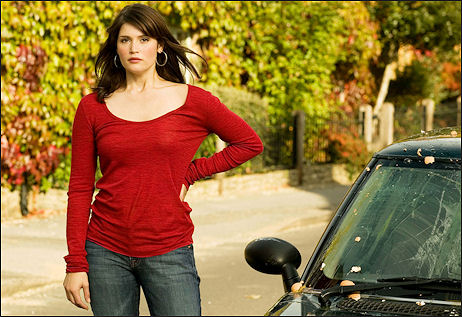My reaction to Stephen Frears‘ Tamara Drewe, which screened this afternoon at the Salle Bunuel, was immediate and unambiguous — I hated it. It’s one of those satires of a form (i.e., romantic fiction) that doubles back and has it both ways by satirizing and playing it “straight,” or straight enough so that romantic fiction fans can themselves double-track by enjoying the cliches at face-value while having a good laugh or snicker. Everybody wins…except people like me.
Boiled down, Tamara Drewe is (a) a comedy by a hip director that’s aimed (whether its backers admit it or not) at intellectually-challenged women of whatever age who read fashion and gossip magazines and older chump-level couples, and (b) a glossy calling-card movie by a director who’s getting on and would like the producers of crap movies to know that he can do “obvious” and “unsubtle” as well as the next guy.
It’s important to absorb Tamara Drewe in the right “insincere” context. It’s first and foremost an adaptation of Posy Simmonds‘ weekly comic-strip serial of the same name, which itself is a modernized, “insincere” adaptation of Thomas Hardy‘s “Far From The Madding Crowd.” (Simmonds’ complete work appeared in hardcover in 2007.)
Hardy’s novel was about three fellows vying for the affections of the beautiful Bathsheba Everdene (played by Julie Christie in John Schlesinger’s 1967 film) — a brawny, whiskered man-of-the-soil type (Alan Bates), an older gentleman of property (Peter Finch), and a dashing mustachioed heartbreaker (Terence Stamp). A lot of horseshit happens, but she winds up with Farmer John at the end.
Frears has the astonishingly empty and generally worthless Gemma Arterton (soon to appear in Prince of Persia) playing Tamara Drewe, an updated Everdene who stirs the hearts and loins of three fellows when she arrives at a writers’ retreat in an English country village. (The film was shot in, around or near Dorset.) Tamara is a newspaper columnist who comes from the area, when she was mildly homely due to an enormous honker. Then she got a nose job, making herself into quite the beauty and yaddah yaddah.
The Bates role is played by Luke Evans, the Finch role by Roger Allam, and the Stamp role by Dominic Cooper.
All I could think as I watched Tamara Drewe was “what a piece of empty unfunny synthetic crap this is.” The fact that it’s satirizing other works that are genuinely, sincerely and wholeheartedly crappy as opposed to being ironically crappy is of no interest to me. I only know that I was in pain.
Frears is generally regarded as a first-rate director who lacks a particular visual or stylistic signature, and who goes where the material takes him. But I found it appalling nonetheless that the director of Bloody Kids, The Hit, High Fidelity, The Queen, Dirty Pretty Things, The Grifters, My Beautiful Laundrette, Dangerous Liasons and Prick Up Your Ears could make a film as icky and over-scored and postcard-vapid as Tamara Drewe, even with such values being rendered “in quotes.”










